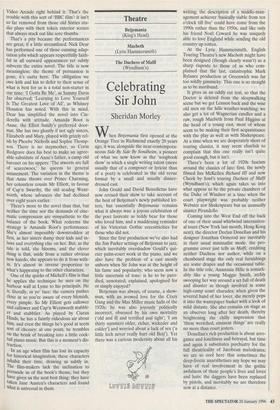Theatre
Betjemania (King's Head) Macbeth (Lyric Hammersmith) The Duchess of Main (Wyndham's)
Celebrating Sir John
Sheridan Morley
When Betjemania first opened at the Orange Tree in Richmond exactly 20 years ago, it was, alongside the near-contempora- neous Side By Side By Sondheim, a pioneer of what we now know as the 'songbook show' in which a single writing talent (more usually that of a composer or lyricist than of a poet) is celebrated in the old revue format by a small and usually dinner- dressed cast.
John Gould and David Benedictus have now revised their show to take account of the best of Betjeman's newly published let- ters, but essentially Betjemania remains what it always was: a joyous celebration of the poet laureate as teddy bear for those who loved him, and a maddening reminder of his Victorian Gothic eccentricities for those who did not.
Since the first production we've also had the Jim Parker settings of Betjeman to jazz, which inevitably overshadow Gould's qui- eter palm-court work at the piano, and we also have the problem of a cast mostly unborn when Sir John was at the height of his fame and popularity, who seem now a little uncertain of tone: is he to be paro- died, annotated, explained, apologised for or simply enjoyed?
Betjeman was always, of course, a show- man, with an avowed love for the Crazy Gang and the Max Miller music halls of the 1920s; he was also joyously politically incorrect, obsessed by his own mortality Cold and ill and terrified and tight'; 'I am thirty summers older, richer, wickeder and colder') and worried about a lack of sex Ca little tech never really hurt old Betj'). Yet there was a curious modernity about all his InffilN DEIWYDg writing; the description of a middle-man- agement achiever 'basically viable from ten o'clock till five' could have come from the 1990s rather than the 1950s, and like only his friend Noel Coward he was uniquely able to love England while sending the old country up rotten.
At the Lyric Hammersmith, English Touring Theatre's new Macbeth might have been designed (though clearly wasn't) as a sharp risposte to those of us who com- plained that the last, catastrophic Mark Rylance production at Greenwich was far too wildly gimmicky. This one is so straight as to be moribund.
It gives us an oddly cut text, so that the Doctor is deleted from the sleepwalking scene but we get Lennox back and the wise old men on the hills weather-watching; we also get a lot of Wagnerian candles and a raw, rough Macbeth from Paul Higgins at the head of a young cast, most of whom seem to be making their first acquaintance with the play as well as with Shakespeare. At a time when we are desperately short of touring classics, it may seem churlish to complain that this one really isn't quite good enough, but it isn't.
There's been a lot of 1920s fascism around the classics of late: first, the newly filmed Ian McKellen Richard III and now Cheek by Jowl's touring Duchess of Malfi (Wyndham's), which again takes us into what appear to be the private chambers of the Duke of Windsor at a time when the court playwright was probably neither Webster nor Shakespeare but an unusually sinister Pirandello.
Coming into the West End off the back of one of their usual whirlwind internation- al tours (New York last month, Hong Kong next), the director Declan Donellan and his designer Jonathan Ormerod are inevitably in their usual minimalist mode: the pro- gramme cover just tells us Malfi, crediting neither Duchess nor author, while on a chessboard stage the only real furnishings are some drapes and the occasional table. In the title role, Anastasia Hille is remark- ably like a young Maggie Smith, archly swooping her way around a set full of death and disaster as though involved in some high-camp court charades; when given the severed hand of her lover, she merely pops it into the wastepaper basket with a look of mild distaste. She also remains on stage as an observer long after her death, thereby heightening the chilly impression that `these wretched, eminent things' are really no more than court jesters.
Donellan's rich production is about arro- gance and loneliness and betrayal, but time and again it substitutes psychiatry for the full theatricality of Jacobean melodrama; we are so cool here that sometimes the deep-freeze anaesthetises any hope we may have of real involvement in the gothic awfulness of these people's lives and loves and lusts: the daggers have been replaced by pistols, and inevitably we are therefore now at a distance.


























































 Previous page
Previous page